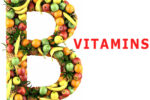Include B vitamins in your diet
This vital group of vitamins should be part of a healthy diet. According to Harvard researchers, B vitamins help enzymes do their jobs, including releasing energy from carbohydrates and fat to break down amino acids and carry oxygen and nutrients throughout the body. Two of the most essential of this group of vitamins are B6 […]
This vital group of vitamins should be part of a healthy diet.
According to Harvard researchers, B vitamins help enzymes do their jobs, including releasing energy from carbohydrates and fat to break down amino acids and carry oxygen and nutrients throughout the body.
Two of the most essential of this group of vitamins are B6 and B12.
Vitamin B6 (pyridoxine) is found in many foods, but it is also added to foods and supplements. B6 is a coenzyme that helps more than 100 enzymes perform various functions, including breaking down proteins, carbohydrates, and fats.
Meanwhile, vitamin B12 (cobalamin) is found in meat and fish. It can also be added to foods or supplements. This substance is needed to make red blood cells and DNA, and it also plays a role in the function and growth of nerve cells and the brain.
B6 helps maintain normal levels of the amino acid homocysteine, high levels of which can cause heart problems. B6 also supports the immune system and keeps the brain healthy.
A recent study showed that taking vitamin B6 supplements may even help relieve depression and anxiety.
“David Field”, the author of the study from the University of Reading, UK, said: “Brain function relies on a delicate balance between excitatory neurons that pass information around and inhibitory neurons that prevent evasive activity. “Vitamin B6 helps the body produce a specific chemical messenger that inhibits impulses in the brain, and our study linked this calming effect to reduced anxiety among participants.”
The recommended dietary allowance of B6 for men aged 14 to 50 is 1.3 mg. For people 51 and older, it is 1.7 milligrams. For women aged 14 to 18, it is 1.2 mg. It is 1.3 mg for women aged 19 to 50 and 1.5 mg for women aged 51 and older. During pregnancy and breastfeeding, its amount increases to 2 mg.
According to researchers, excessive consumption of B6 can cause numbness in the legs and hands, loss of control of body movements and nausea.
Vitamin B6 is found in a variety of animal and vegetable foods:
• Beef liver
• tuna fish
• Salmon fish
• Fortified cereals
• Pea
• Birds
• Some vegetables and fruits, especially dark leafy vegetables, bananas, papayas, oranges and cantaloupe.
Vitamin B12 helps break down a protein called homocysteine. High levels of homocysteine are associated with an increased risk of heart disease and stroke because they can contribute to the formation of blood clots and free radical cells and affect the normal function of blood vessels. Insufficient vitamin B12 can increase homocysteine levels.
The recommended dietary allowance for men and women 14 years of age and older is 2.4 micrograms per day. During pregnancy and breastfeeding, this amount increases to 2.8 micrograms per day.
No upper limit has been set for vitamin B12, as there is no toxic level. However, a recent study suggests that supplements of 25 micrograms per day or more may increase the risk of bone fractures.
On the other hand, vegetarian diets that eliminate meat can lead to vitamin B12 deficiency with serious health problems.
A recent study found that although a vegetarian diet reduces the risk of heart disease, it increases the risk of stroke.
Foods rich in B12 include:
• Fish, shellfish
• Liver
• Red Meat
• egg
• Birds
• Dairy products such as milk, cheese and yogurt
• Enriched nutritional yeast
• Fortified breakfast cereals
• Fortified soy or rice milk
این مطلب بدون برچسب می باشد.
















Leave a Reply